The creation of the Southern Front and the events in the Moscow Military District
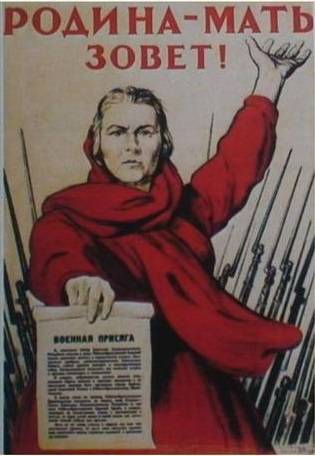
Deploy front-line management
19 June 1941 from the General Staff to the headquarters of the Arkhangelsk Military District (ArVD) is sent a cipher telegram (PC) on the beginning of the deployment of front-line control. The text of the telegram could not be found, but in another document there is a link to the specified PC.
PC №2706 / org from 24.6.41:
Copies to the deputy chiefs of the Main Political Department, the operational management of the General Staff, the head of the personnel department of the spacecraft.
During the change of directive of the General Staff No.org / 1 / 524033 from November 19.06.41, XNUMX The field control of the front provided for in the deployment scheme should not be formed. It is necessary to form an army field office with service agencies, guards, editors and printers of the army newspaper according to staff number 48 / 926.
The formation of the field control of the front, the editorial staff and the printing house of the newspaper of the front is completely removed. V.Sokolovsky
19 June in the General Staff, a decision is made to begin the mobilization deployment of the front control based on the ArVO. Where should the deployed control go from ArVO?
In the evening of June 21, a decision is made to create LF and second-line armies. June 22 from the MVO is allocated headquarters LF. The commander of the army of the second line Marshal S.M. Budyonny is forced to form his headquarters on his own. 21-22 June order to cancel the deployment of front-line control in the ArVO is not received. Therefore, the management of the ArVO was not intended either for the headquarters of the law firm or for the headquarters of the second-line armies.
The author has only one version of the purpose of the said administration, which has no documentary evidence: the administration was intended for the commander of the direction, which included the LUF and the LF. Late in the evening of June 22, the Chief of the General Staff arrives at the headquarters of the South-Western Federal Branch to monitor the implementation of measures about the counterstrike on Lublin. At headquarters, he learns about the real situation at the front, and 23 Jun sees an ever-worsening state of affairs. The situation is changing rapidly, and its headquarters is still in the formative stage and it is not known when it will be able to arrive. In this situation, the headquarters of the direction is no longer needed. Now, if two fronts attacked abroad and between the fronts and the headquarters of the South-West direction, a huge document flow would have appeared - then another thing ... Perhaps, on his instructions, Assistant Chief of the General Staff General Sokolovsky cancels the earlier decision, which is reflected in PC.
In cycle it was shown that not all military and civilian specialists in Moscow were expecting a June 22 war. To understand the atmosphere of that time, I will give an excerpt from the diary of Academician V.I. Vernadsky: "[19.6.41]
Call commanding staff of the Moscow Military District
At the headquarters of the Moscow Military District 19 Jun, everything is ordinary, quiet and peaceful. The staff of the headquarters assigned to the field management and the assigned staff work quietly in their places: in the headquarters of the Moscow Military District and in civil organizations. They are not aware of the imminent field trip. The leadership of the Moscow Military District does not cancel the planned army field trip on June 23. Probably, during the study trip, they were supposed to prepare the assigned commanding staff for staff work. Generals Pokrovsky and Sparrows wrote in their memoirs about the unpreparedness of field administrations to their work.
A.P. Pokrovsky (subsequently the chief of staff of the second line armies):
That is, there were cadres, but even the presence of the best cadres, knowledgeable, experienced people - this does not in itself create an efficient headquarters. The headquarters is in the work: it must be prepared. And what did we get?
For example, in order to create the headquarters of the law firm, an MBO management was sent there. But the management of the MBO was not up to date. It knew neither this theater, nor these troops, nor all that is connected with the preparatory work that preceded the war in the headquarters of those formations that should be deployed in this particular theater of operations. The headquarters of the Moscow Military District, who arrived there, to the south, and became the headquarters of the law firm, for a long time understood the situation and mastered it. Of course, it was wrong ...
Anticipating hostilities, we could have, in the south, a pre-formed headquarters of the LF headquarters. And it would cost not so expensive in peacetime and could be created not openly, but closed, under a different name ...
V.F. Vorobiev:
21.6.41 I was unexpectedly appointed for me unexpectedly by the head of the operational department of the headquarters of the law firm, which was formed from the staff of the Moscow Military District. I did not study the southern direction and did not know this theater.
The staff of the LF headquarters on 50% was staffed from reserve officers who were drafted into the army for two or three days on the eve of the war. In the operations department, of which I was the head, no one of the called-up officers of the reserve could independently keep a log of military operations, compile a combat report, an operational summary, systematically keep a work card. This is explained by the fact that at the gathering the officers assigned to the district headquarters were not engaged and not used according to the posts they were intended for during the war ...
On Friday, June 20, the headquarters of the 1080 military unit, including the subscription composition, is raised in alarm. This is evidenced by the text of the name "A list of commanding officers ... who did not appear on call.
Consequently, there was a call (gathering or alarm), which was not attended by one commander from the operational department (GS).
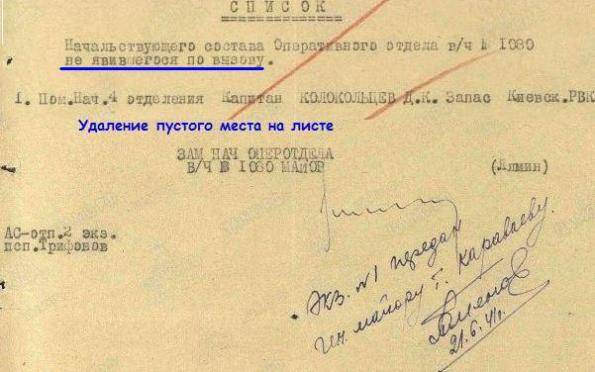
Why did the call take place 20 Jun? In mid-August, when it was already clear to all that the war would last long, a new document appeared. The document refers to the accrual of service from 20 June commanders who are called to the spacecraft. The names of the commanders are also in the list of arrivals on call.
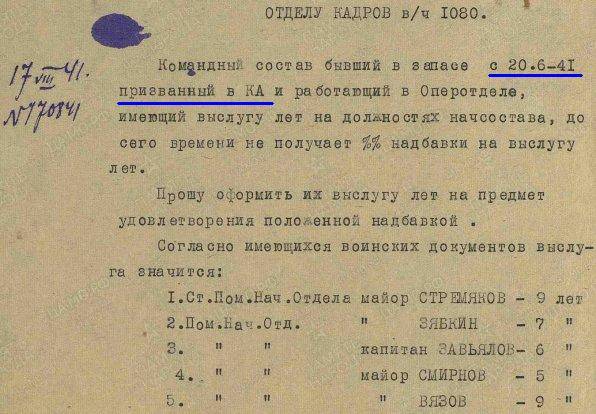
Below is a list of the commanding staff of the OO X / NXX military unit, who appeared on call. On June 1080, both lists were sent to the Deputy Chief of Staff of the Moscow Military District for logistics services to Major General I.М. Karavaeva for setting for contentment. This is evidenced by the date on the resolution.
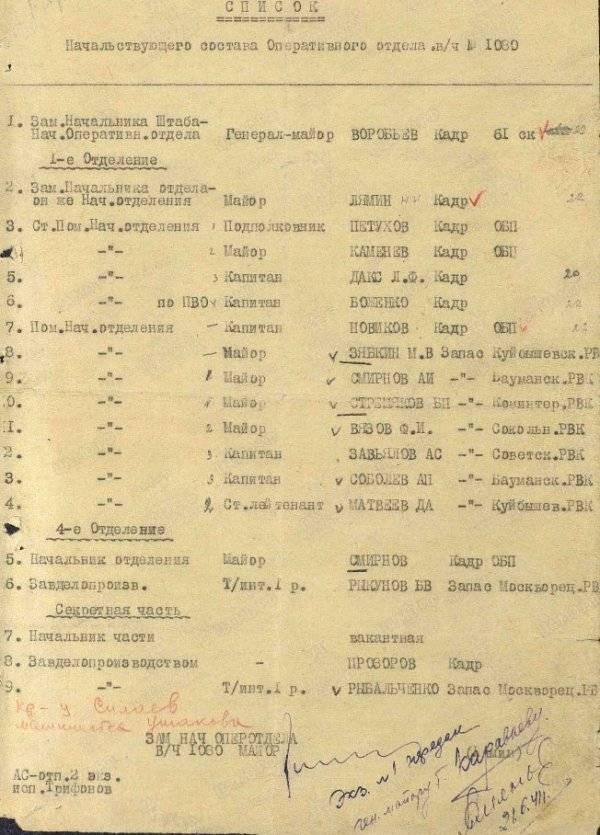
The list includes 20 people, including the deputy chief of staff - the chief of the PA, General Vorobyov, and the deputy chief of the PA, Major Lyamin. If Captain Kolokoltsev had arrived, then the 21 man was on the list. You do not think that this number of commanders is too small for the OO headquarters of the army or the front?
At that time there were no computers, the text was typed or written in handwritten form. OO is a lot of reports, maps and other documents. Even the two documents presented above are typed on a typewriter. The situation on the cards for beauty applied draftsmen. They also put text on the cards both in the headings and in the tables. Of course, when it allowed time.
Before the transfer of both documents to General Karavaev, a draftsman (Red Army man Silaev) and one typist Ushakov were inscribed in the list of departing people with a red pencil. If a Red Army soldier's servant is where they are sent, they will go there, then it is another matter with a typist ... A typist is a freelance person, and an irregular working day is not supposed to be her as a military man. For civilian personnel normalized working day. By law, he should pay for processing, but somehow this issue is still decided. Note that they were included in the list by one specialist, bringing the total to 22 people.
At that time, the GS organization also included the division of the specialists of the cryptographic-staff service (SS), who were withdrawn from its composition only by the beginning of July 1941. The reason was the violations identified during the inspection of the Operational Directorate of the General Staff. In particular, it was found that the outgoing and incoming PF on operational issues were shared with the management staff.
There is no cryptographer in the list above! Where was the field office going to go without the ShShS specialists? Right! To study! The ciphers are an expensive thing, and you can teach the personnel of the NGO and on unencrypted messages (without the lifting of the WSS specialists).
Field front or army control
How many people were listed in the OO headquarters of the army or the front? Information about the number of people in the NGO on the eve of the war could not be found. However, it is known how many full-time posts were in the OO headquarters of the army and the front in the state of 02 / 45, which was introduced from July 1. The table in the figure uses the following abbreviations: “military unit” - military personnel, “military unit” - civilian personnel.
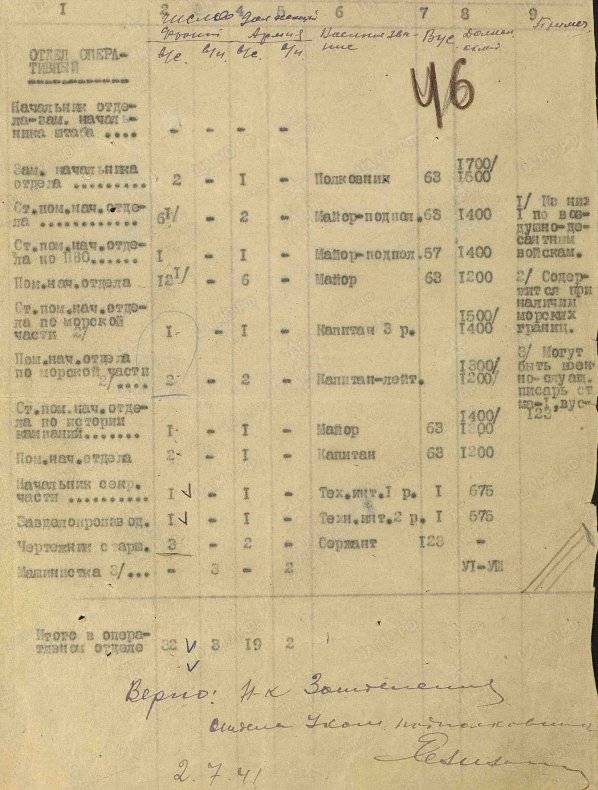
Without a chief of the OO, who is simultaneously listed as deputy chief of staff, there are 02 posts for the front headquarters and 45 for the army headquarters in the 35 / 21 staff department. Remove from the list of soldiers on the naval part (senior assistant - 1 and assistant - 2). Positions related to maritime affairs may be occupied only by servicemen of the Navy Commissariat (Captain of rank 3 and Lieutenant Commander). There are no soldiers on the Navy side in the list of OOs from 20 June. Add to the number of employees of OO head of the department, which is listed in the list of June 20. Get the number of posts in the OO headquarters of the front and the army 33 and 19, respectively. It turns out that in the list from June 20 the number of people (21) is close to the number of OO army headquarters (19). The only difference is that the OO headquarters of the front and the army on the staff 02 / 45 is listed on the 3 or 2 draftsman and the typist, respectively. There is only one draftsman and one typist on the list for June 23.
By the way, in the dedicated cryptographic department by staff number 02 / 45, there were 29 and 22 specialists for the front and army headquarters, respectively. The ShShS front staff also included a school of cipher technicians with an 65 specialist.
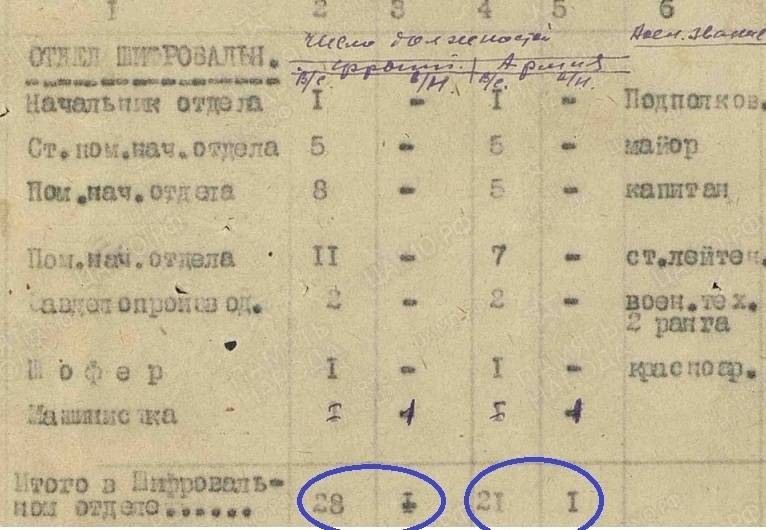
It turns out that the field office of the army, not the front, was going to the 23 study trip on June. The number of departing specialists were not included. After the call, the subscription was dismissed home until Monday. The figure below shows that the commander who was summoned on June 20 from a reserve to participate in a field trip is called up for service only after the start of the war.
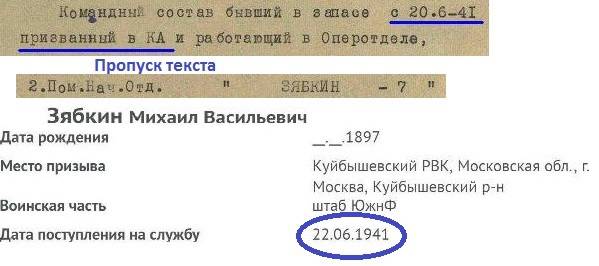
In the postwar period, the assigned composition was called for fees, and they received wages at the place of work in a civil organization or enterprise. It can be assumed that the same practice could have existed before the war. Therefore, the commanders who arrived on call warned about the study trip on the 23 number and were released to their homes. 22 June they were called to the spacecraft, as they had to go to the place of deployment of their military unit - the headquarters of the Law Faculty.
Memories of veterans from the headquarters of the Moscow Military District
The staff after the collection went to service on Saturday 21 June. On this day, there is no excitement at the headquarters of the Moscow Military District about the rise on the eve of the assigned composition of field management. After all, the trip was planned, training, short and for a short distance.
Gen. A.I. Shebunin (Chief Quartermaster MBO) was not planned to participate in the field trip. He wrote that June 21 was a typical Saturday day:
The divisional commander Zakharkin was at the General Staff of the space station that day, from where he arrived at the dacha. According to him, I realized that the atmosphere in the General Staff seemed he is troubled. After exchanging opinions, Ivan Grigorievich and I agreed that there are very real reasons for alarm. I was anxious in my heart when he left the hospitable division of the divisional commander late at night. But still I was far from thinking that only a few hours separated us from the beginning of the terrible events that were destined to shake the world...
Chief of Engineers of the Moscow Military District A.F. Hrenov writes:
Memories of the former cadet of the Moscow Red Banner School named. Supreme Council of the RSFSR V.P. Diveeva:
Light anxiety in the headquarters of the Moscow Military District. It could be related to the anticipated exercises of the field control, the 7 th mechanized corps, the 1 th air defense corps. It is possible that the exercises were also expected in other units of the district. Left cadets cadets on the night of June 22, but the alarming condition appeared only after the start of the war ...
Early morning 22 Jun
The commander of the Moscow Military District troops, General I.V. Tyulenev wrote:
It turns out that General I.V. Before dawn, 22 Jun did not know about the decision to create the law firm. One inaccuracy that is immediately visible: a call to the Kremlin in 3-00. At that time there was no one in the Kremlin in the Kremlin.
The information that they learned about the formation of the LF headquarters only in the morning of June 22 is confirmed by other generals from the headquarters of the Moscow Military District. From their memoirs, one can find out a more accurate time when the commander of the Moscow Military District troops was invited to the Kremlin and when they began to call the command personnel to the Moscow Military District headquarters.
Gen. A.F. Hrenov:
“Comrade general,” came the excited voice of the operational duty staff of the district, “the commander calls you.” It is ordered not to linger. The car is leaving now ...
In the reception of the commander, I found the chief of staff, Major-General GD. Shishenin, head of the political department of divisional commissar F.N. Voronin, head of logistics Major General A.I. Shebunina and several other comrades ...
Soon the commander appeared and invited us to the meeting room of the Military Council ... Going into the hall and accepting the report of the chief of staff, he did not sit down as usual, but remained standing: "Comrades, at four o'clock with the minutes I was called to the Kremlin. K.E. Voroshilov and S.K. Tymoshenko told me that fascist Germany had treacherously attacked our homeland ...
Ivan Vladimirovich said that he was appointed commander of the LF troops, a member of the military council — Army Commissar 1, rank A.I. Zaporozhets, chief of staff - Major General GD Shishenin. The heads of the arms and services of the front are appointed by the appropriate heads of the district. Field control departs to the front in two echelons. Destination - Vinnitsa. The composition of the first echelon should be ready for shipment today, the composition of the second - tomorrow. Then he announced who was leaving for the first echelon, determined the time of gathering at the Kiev station to 15 watches and ordered me to take up the duties of the head of the first special train ... ”... Arkady Fyodorovich specifies the time of the call of the commander of the Moscow Military District to the Kremlin: at 4 o'clock with minutes.
Gen. A.I. Shebunin: "...At six in the morning 22 June 1941, the command personnel of the Moscow Military District, who lived at the cottages in Serebryany Bor, were alerted to the district headquarters. Here we were officially informed about the beginning of the war with Germany. Chief of Staff Major General GD Sishenin announced the order of the People's Commissar of Defense, according to which the Moscow Military District had to urgently allocate a part of the higher commanding staff to form the LF administration in Vinnitsa ...
Only in the morning did General Shebunin find out that he, too, was a member of the command staff of the law department and should serve the first echelon to Vinnitsa. For the first time, the destination was announced on the morning of June 22. That is why no one knew where the front headquarters would be located and there were no maps. The call time was also clarified: at six in the morning. In the memoirs, too, there is an inaccuracy: the order of the People's Commissar of Defense was not yet at dawn on 22 June.
General V.F. Vorobyev wrote that in the evening of June 21 he unexpectedly found out about his appointment as the head of the law firm OO. In the list of arrivals on call 20 June, a tick is inscribed in front of his last name in red pencil. Of course, he did not have to come to the headquarters of the Moscow Military District on call, but on June 20 he had to learn about his participation in the field trip. The unexpected appointment in the evening of June 21 is in doubt, since neither the head of the engineering service, nor the chief quartermaster of the Moscow Military District on Saturday are yet aware of their appointments. General Sparrow or mistaking the number 21, confusing it with early morning 22 June. Or he could have been informed about a new appointment by a certain friend from the General Staff. But this is only the author's assumptions.
The first documents of the operative department of the headquarters of the Law Faculty
After notifying the commanders on the allocation of front-line control from the MVO, the registration of the subscription composition in full begins.
The case of an OO 1080 military unit begins with the document presented above (sheet 1). However, this does not mean that this document was prepared earlier than the subsequent documents in the file. Documents in affairs are hemmed in process of receipt in a secret department.
In the case, behind the list of the commanding staff, decreasing by echelon, there are lists of the commanding staff who appeared and did not appear on call (sheets 2 and 3). On the above lists there is a resolution: [i] "Ex. No. 1 has been handed over to Major General G. Karavaev. 21.6.41."... Consequently, both documents were printed on the evening of June 20 or the morning of June 21, and the resolution was applied on Saturday. There is not a single correction in both documents - these are ordinary documents of peacetime. Nicely designed: no mistakes or fixes.
The new document (list of decreasing echelon) is already a wartime document, as it has numerous edits:
1) Captains Dax and Bozhenko removed from the list. Captain Bozhenko departed for Vinnitsa on June 22, and captain Dax departed for 23 on June with the main staff of the OO;
2) the list includes the WSS experts who were called only on 22 June;
3) in the list three experts of the WSS and 11 cadets, who were assigned to the NGO 22 June, were written in handwritten dough;
4) the list was supplemented by personnel two times. First time "signature st.pom.nach. 1 Division Petukhov"is peeped above the mention of cadets. The second signature we see at the bottom of the document.
Thus, we can conclude that the list of commanders was prepared no earlier than June 22. Consequently, the 2 and 3 sheets in the OO case appeared before the specified list.
Captain Kolokoltsev D.K. - this is Kolokoltsev Dmitrievich Konstantinovich. He was crossed out with a red pencil in the list of officers who did not appear on call. So he still appeared. Probably 22 or 23 Jun. Subsequently, he did not serve in the headquarters of the Law Faculty.
From the personnel of the PA, noted in the list of commanders (outgoing train), it was possible to establish:
1) Zyabkina MV, Smirnova A.I., Stremenkova B.P. and Sobolev A.P. - called up from stock 22.6.41 g .;
2) specialists of the WSSS Lyubimov N.S., Platonov M.I., Yumatov A.S., Kochko I.L., Belousov V.P. were called from the stock also 22 Jun.
In the column "call date"the rest of the FSS specialists noted"June 1941 g"Probably they were also called up from the June 22 reserve, and the lack of a date is negligence or haste in the paperwork. A similar situation exists in the documents of senior manager of the administrative service Rykunova BV, quartermaster Y. Rybalchenko and other OO commanders called up from the reserve;
3) the list mentions three typists. These are freelance staff: Savchuk, Berezhkovskaya and Ushakova (later the name of the typist Zakharova appears in the documents of the LF headquarters), who were not planned to take part in the field trip on June 23. In the documents Savchuk AP, Berezhkovskoy Z.A. and Zakharova A.N. marked the date of entry into service - 22 June 1941 year;
4) of the draftsmen who found themselves in the OO headquarters of the Law Faculty, it was possible to restore only Ryabinov MA (called to 22.6.41 G.) and Denisova S.B. (called to 23.6.41 the city of Kirov RVK Moscow);
The list refers to 11 cadets without specifying the military institutions in which they previously served. As of 20 July, 7 cadet trainees and 9 NKVD frontier cadets are on the staff of OO.
From 7 cadets-trainees managed to establish: Terekhin Ivan Vasilyevich, Krasavin Nikolai Alexandrovich, Korshunov Georgiy Gennadievich and Zhelannii Mikhail Vasilyevich. All of them are called to the spacecraft in 1940 year, sent to the army 22 June and served in cryptographic communications. It turns out that they are all from the cipher school of the Moscow Military District and are attached to the OO as cipher-trainees. At that time, only the QA commanders from the junior lieutenant and above could be the coders.
Of the 9 border guard cadets, only two cadets of the Higher Border School (Moscow) were established: Yu.E. Gazenklever. and Nagarnikova V.D. On the school website there is information that because of the start of the war, cadets who entered the school in 1940 (17-th recruitment of core students), starting from June 22, were sent to military units sent to the front or stationed in defensive positions. 21 June no one has sent cadets of the frontier schools to the troops.
From which cadets the number of 11 formed, which is given in the list, is difficult to say. It is possible that when sending later, a larger number of cadets were included than was noted in the list.
From the presented data it is clear that the OO staff of the LF began its deployment in full only on 22 June. The order of the Military Council of the Law Firm of 2.7.41 states:
It turns out that as of July 1, the headquarters of the Law Faculty had over-the-staff personnel. This is confirmed by the document.
The ending should ...
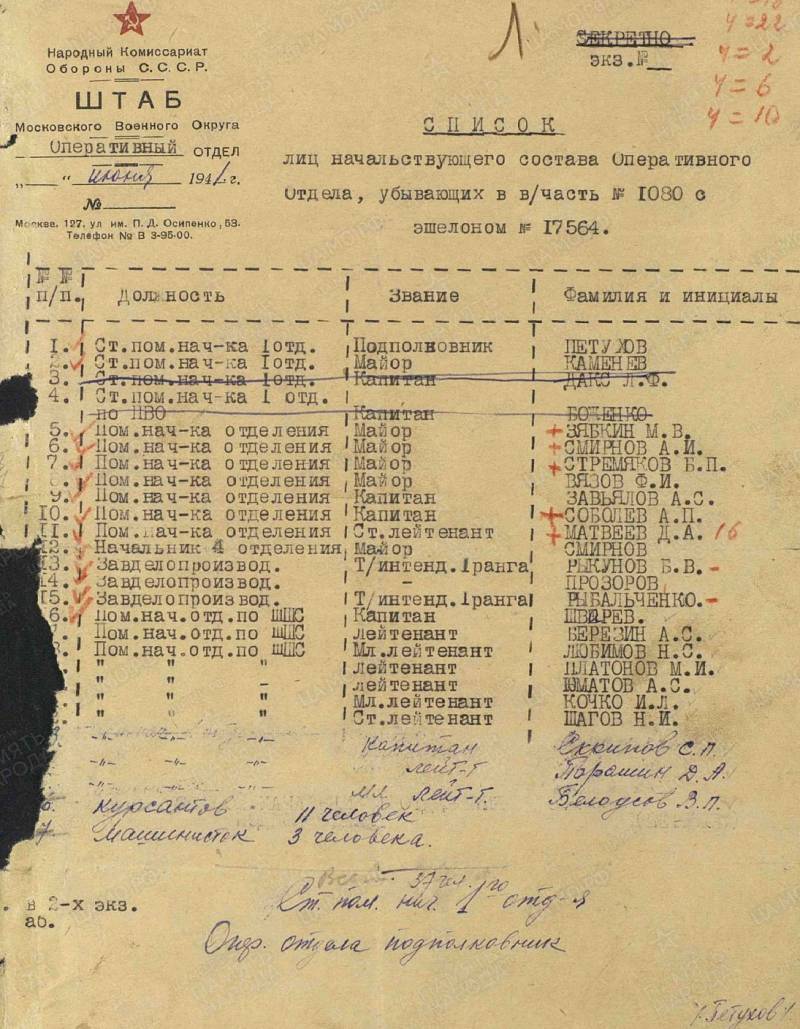
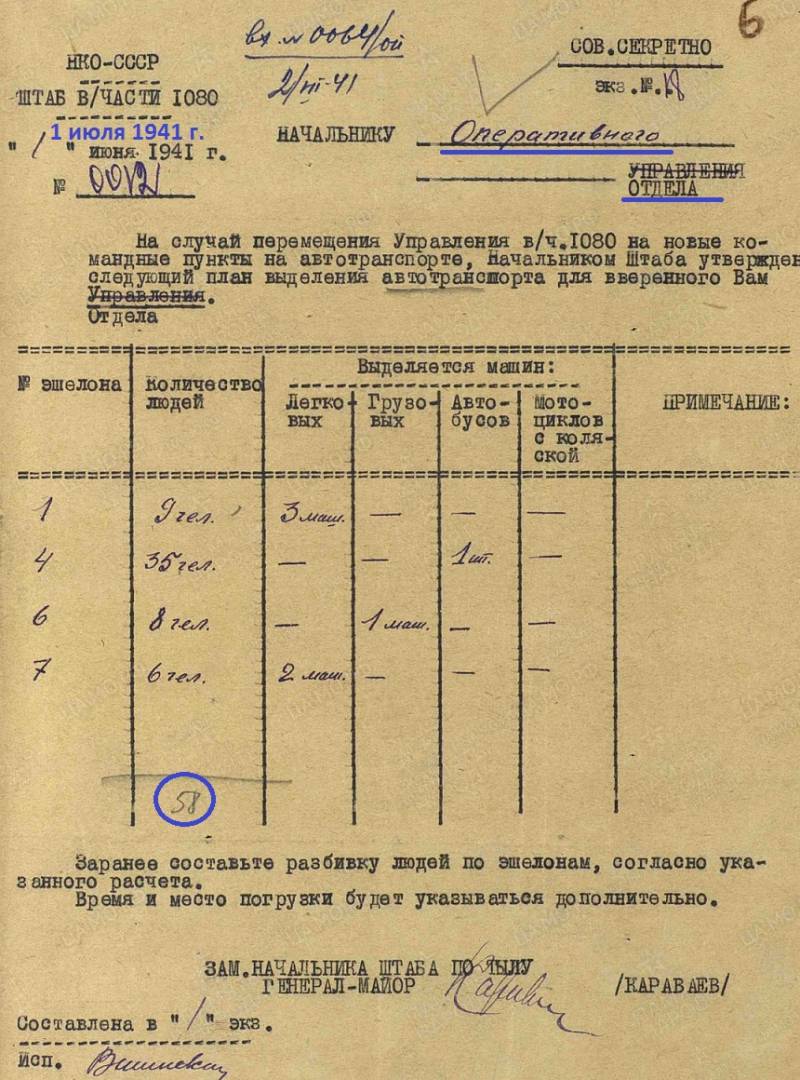
Information